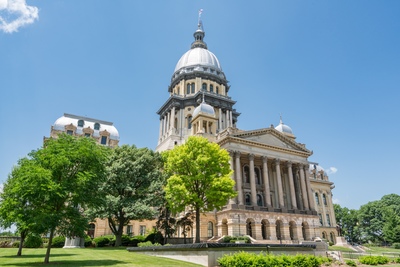
Energy & Environment
How Small Modular Reactor Laws Are Reshaping State Nuclear Energy Policy
January 23, 2026 | David Shonerd
November 1, 2023 | Matt Crawley

Key Takeaways:
This article is part of our latest series: Major Issue Trends in 2023: State Legislative Recap. In this series, our experts examine the high-level legislative trends they saw in the 2023 state sessions. In addition to discussing the most prevalent issues considered by state policymakers, they explore some of the more surprising emerging trends we noticed, plus what to expect in 2024 for many of these policy areas. The series will be released during November and December, with new articles each week. Explore the full series here, and be sure to sign up for our email list so you don’t miss out on any articles (check the “Blog Posts” box).
America recycles about 5% of its plastic, while the rest is poured into landfills or incinerated. “Advanced Recycling” is a loose umbrella term used to describe a number of non-mechanical methods for recycling plastics, including chemical recycling methods. Proponents in the chemical industry tout it as an effective and sustainable solution, while environmental groups question its impact and claims of sustainability, and some recycling industry groups dispute the scope of its definition. The 2023 legislative sessions saw the consideration of 38 bills relating to advanced recycling in 23 states. Of these, eight were enacted, three of which established advanced recycling standards for the first time in their states — Indiana, Kansas, and Utah — which brought the total number of states regulating advanced recycling to 24.

The trend has been on the rise since Florida became the first state to recognize advanced recycling in 2017 and is expected to continue, particularly in red states, despite environmental groups’ arguments challenging advanced recycling’s claims of impact and sustainability and recycling industry groups' refutation of what “advanced recycling” has been legislated to mean.
The three new laws mirror their predecessors in that they redefined advanced recycling practices as manufacturing, rather than as solid waste management. This frees advanced recycling facilities from the more onerous regulatory and permitting burdens governing traditional plastics recycling, and allows facilities to receive certain state financial incentives, even as it binds their operation to new incentive requirements.
Of the other bills that were enacted, three were aimed at further clarifying what practices count as advanced recycling — a small, but important distinction with financial and environmental implications. For example, LA SB 100 and TX HB 3060, determined that plastics incineration and waste-to-energy processes are not advanced recycling. Waste-to-energy facilities have been one of the major flashpoints within the greater debate surrounding advanced recycling. The process has for years been touted as a practical alternative to landfilling plastics, much to the dismay of environmental groups and even of some recycling industry groups whose definitions of recycling do not include the practice. While Louisiana and Texas have amended their definitions, other states still maintain the line that waste-to-energy is acceptable under the advanced recycling umbrella.
The final two enacted bills came from Connecticut, where Governor Lamont (D) had hoped the legislature would offer solutions to the state’s current reliance on shipping waste to out-of-state landfills — a practice he called “environmentally and fiscally irresponsible.” While they do not implement “advanced recycling” regulations, as such, they do touch upon relevant issues. For example, despite major concerns, Governor Lamont signed CT HB 6664 into law in June, which, in addition to providing $5 million for waste-to-energy facilities, directed the Department of Energy and Environmental Protection (DEEP) to “issue a request for information for new material management providers, including those that use gasification systems, which ‘convert solid waste into gas through a chemical reaction that does not consist of burning.’”
Gasification traditionally falls under the advanced recycling umbrella, however, its use is vehemently opposed by environmental groups who have pointed out that the practice has “the same toxic, climate-damaging impacts as incineration.”
Not one to overlook the environmental impact of waste removal, Governor Lamont also signed CT SB 1147, which enhanced the power of Connecticut’s Environmental Justice statute. The bill required permits for new or expanded recycling or solid waste incineration facilities to include an environmental or public health impact assessment and be subjected to public review. The bill also gave DEEP and the Connecticut Siting Council the ability to reject permit applications if pollution from the facility would further impact or create an overburdened community. Environmental justice issues have become inherent to legislative conversations about advanced recycling in recent years, especially since the majority of advanced recycling facilities are located in historically marginalized communities.
The protection of residents and the environment more generally has prompted some legislatures to move towards banning advanced recycling practices altogether. In 2023, Massachusetts and Rhode Island introduced bills that sought to ban advanced recycling practices. In Rhode Island, HB 5142 took aim at the facilities. Specifically, the bill would have, prohibited the construction and issuance of permits for new high-heat waste facilities, including “advanced recycling facilities, chemical recycling facilities, molecular recycling facilities, and any other facility that uses a thermochemical process to convert post-use polymers, plastic, or recovered feedstock into fuels, chemical feedstocks, or other uses.”
In a slightly different vein, Massachusetts went after the processes themselves in HB 3701, which would “prohibit the use of ‘Regulated technologies,’” including “the use of plastic as a fuel or fuel substitute or the general use of plastic in energy production or any other process used to transform plastic or plastic derived materials into plastic monomers, chemical feedstocks, certain fuels and other products.” The bill is still active as Massachusetts has a two-year session.
Additionally, Beyond Plastics, a Bennington College-based project aimed at ending plastic pollution, released, as part of a new report, model bill language for use in state legislatures that want to ban chemical recycling, which falls under the “advanced recycling” umbrella. The language would exclude "chemical conversion technologies” from the state definition of recycling and would prohibit their deployment. The model bill would also prohibit the offering of state incentives for facilities using chemical conversion technologies or programs supporting their development, while providing for enforcement according to the state's discretion.
Plastics recycling legislation is entering a new phase with public pressure mounting on lawmakers. In some form or another, the bipartisan consensus is that the status quo for plastics recycling is no longer feasible and something needs to be done to better protect citizens' health and well-being. There the consensus ends and the congruent issues of environmental justice, permitting, and infrastructure create diverging opinions on how to proceed. We will be looking mostly at red states, as they are the primary drivers of advanced recycling legislation, especially those that already have advanced recycling laws on the books. If Louisiana and Texas are any indicators, there are still tweaks to be made to existing legal frameworks and regulatory options yet to be considered. However, there are also blue states — even trifectas, like Connecticut — that have demonstrated their willingness to consider advanced recycling methods, even while striving to protect environmental justice communities. That said, there are also states with a history of introducing bills hostile to advanced recycling methods. In this vein, we will be watching Rhode Island and Massachusetts in 2024, specifically MA HB 3701 and waiting to see if the model legislation put forward by Beyond Plastics garners traction in state legislatures.
MultiState’s team is actively identifying and tracking legislation related to recycling so that businesses and organizations have the information they need to navigate and effectively engage. If your organization would like to further track recycling or other related environmental issues, please contact us.

January 23, 2026 | David Shonerd

January 22, 2026 | Daniel Kampf

October 27, 2025 | Billy Culleton